|
|
| |
| EVENTS |
|
|
> No representation without taxation, Experts tell MPs
- Pakistan ranks 153rd number in the world in tax to GDP ratio, just ahead of Congo
- Budget is based on loans and grants that are taxes paid by people of foreign countries
- Defence Allocations not possible to understand through Budget Documents
- Government loses Rs.1.3 Trillion annually in form of leakages and corruption
- Parliamentary Budget Process has to be made more effective
- Sweeping Powers of Executive to spend beyond originally passed budget according to Constitution Article 84 need to be reviewed
|
|
|
|
| |
Islamabad; June 06. In the PILDAT briefing on How to effectively participate in the Budget Debate, experts told MPs that Parliament, political leadership and ruling elite of Pakistan have to lead by example in paying taxes to avoid catastrophic future for the country. While foreign aid is criticized, and it should be under effective scrutiny of Parliament, MPs must note it is actually taxes that citizens of foreign countries pay to their governments. Pakistan ranks at 153rd number in the world countries in tax to GDP ratio, just ahead of Congo. It was highlighted that the people should launch a movement with the slogan �No Representation without Taxation� to bring ruling elite into the tax net. The Parliamentary budget process needs to be made more effective and that the Parliament and its committees should play an effective role in influencing and scrutinizing the budget before its passage. PILDAT has recommended that a pre-budget session should be held by the Parliament every year; Committees should hold pre-budget public hearings and budget period in Parliament be extended to atleast 60 days, in which committees should review departmental budget. The vast powers of the executive relating to supplementary budget spending allowed by the Constitution in Article 84 according to which the executive has powers to spend beyond the originally approved budget, need a Parliamentary review. There are perhaps no more than 2-3 countries in the world including Pakistan where there is no ex-ante (before the expenditure) approval of the Parliament of supplementary budget, it was noted and therefore, Article 84 of the Constitution needs a review. Furthermore, the participants also stressed the need to form a consensus-based national economic strategy, where the provincial governments should be taken on board and development projects be prioritized in view of the limited financial resources. |
|
| |
Mr. Nohman Ishtiak, Financial Expert, Mr. Abid Niaz Hasan, Former Advisor Operation-World Bank, Mr. Sakib Sherani, Former Advisor to Finance Ministry, Mr. Mohammad Malick, Editor, The News and Mr. Muhammad Zia ud Din, Executive Editor, The Express Tribune spoke at the briefing session. A PILDAT Brief for Parliamentarians titled Main Contours of the Federal Budget 2011-2012 was especially prepared and disseminated to Parliamentarians ahead of the start of the budget debate in Parliament.
|
|
| |
Dr Farooq Sattar, Federal Minister for Overseas Pakistanis, said that current budget is not a representative budget, rather it is once again a traditional budget. He stressed that it is time to save the country rather than saving just a government. He stressed that the law and order situation is important for economic improvement and there is an urgent need to improve it. He demanded that a land reform package should be introduced in the budget. |
|
| |
Mr. Nohman Ishtiak, Financial Expert, briefed the Parliamentarians about the important points of Federal Budget of the financial year 2011-12. He also briefed about some important expenditure Federal Government in comparison with last year federal Budget. He said that total income of the Federal Government is Rs. 2870 Billion while its total expenditures are Rs. 3720 Billion and deficit is Rs. 850 Billion, which is 4% of the GDP. Total interest the country pay is 52% while defence expenditure is 32% of revenue. He said that total loans on the country are more the Rs. 10,000 Billion. He said that increase in defence budget as compared to last year is 12%. He said that fiscal mismanagement in 2007 and 2008 is the major reason for Government to have gone to the IMF. |
|
| |
Mr. Abid Niaz Hasan, Former Advisor Operation-World Bank, in his briefing said that Government often tends to show higher revenues and less current expenditure and Parliamentarians should probe these figures during budget debate. He said that there should be integrated national programmes and uniformity in taxes. He stressed that until leadership doesn�t pay taxes, no improvements can be made in tax system of the country. He said that Parliamentarians should ask the Government about the effects of taxes on different segment of society. He believed that major spending of Government should be revisited and priorities should be re-designed. Parliament should debate on the effectiveness of the proposed projects. He believed that loans should be carefully examined by the Parliament. |
|
| |
Mr. Sakib Sherani, Former Advisor to Finance Ministry, said that budget is only one part of Government policy not the whole. Private investment is 8.5% of the GDP, which is at its lowest in the last 10 years. Inflation is 14.1% in 2011 which is very high. The tax to GDP ratio is 8.8% which has reached an alarming situation. He believed that Parliamentarians have a major role to play in increasing taxes through introducing tax reforms like agriculture sector comprises 21% of GDP but contribute only 1% in tax. He said that defence budget is shown in three different heads in budget documents and Parliamentarians do not know how much is actually being spent on defence while looking at budget documents. Defence budget is almost 75% of the revenue. |
|
| |
Mr. Mohammad Malick, Editor, The News, while speaking on how media views budget speeches said that Parliamentarians making budget speeches should be concise and fact-oriented, not make sweeping statements and catch the interest of the press gallery through creative openings. He said that speeches beyond 7:30 pm are hardly covered by the media. MPs should also focus on getting facts across, introduce different angles, think outside the box and remember that impressing media is more difficult than impressing electorate. |
|
| |
Mr. Muhammad Zia ud Din, Executive Editor, The Express Tribune, said that since Parliamentarians belong to ruling elite, they protect their interests while passing budget. He said that FBR is one of the most corrupt organizations in the World and until that is dismantled and re-oriented, the country can not have better taxation. He said that Pakistan and Pakistanis are living in denial about defence spending and realities on the ground. Unless Pakistan makes peace with India and trades with India, things will not improve. |
|
| |
Ms. Aasiya Riaz, Joint Director PILDAT, introduced and conducted the briefing. Members of Parliament from major political parties joined the briefing. |
|
| |
|
|
| |

|
|
| |
|
|
| |
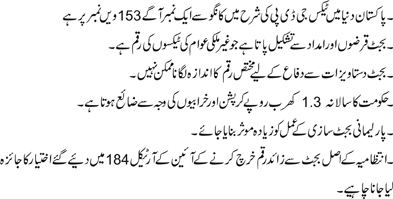
|
|
| |
|
|
| |
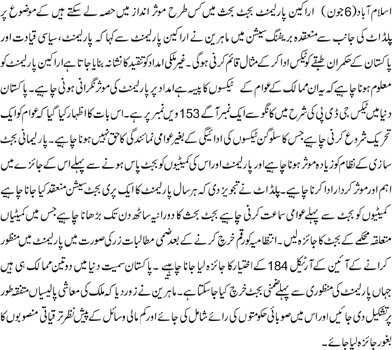
|
|
| |
|
|
| |

|
|
| |
|
|
| |

|
|
| |
|
|
| |
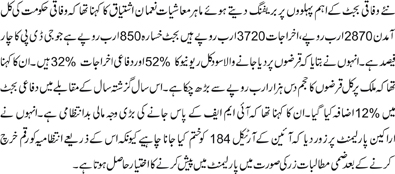
|
|
| |
|
|
| |
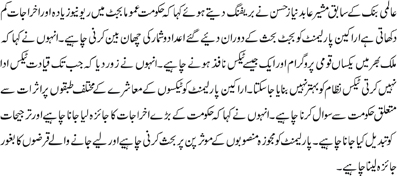
|
|
| |
|
|
| |
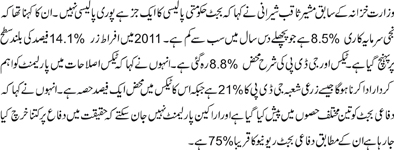
|
|
| |
|
|
| |

|
|
| |
|
|
| |

|
|
| |
|
|
| |

|
|
| |
|
|
| |
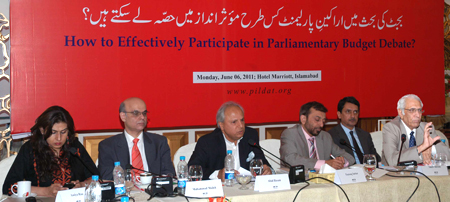
|
|
| |
|
|
| |

|
|
| |
|
|
| |
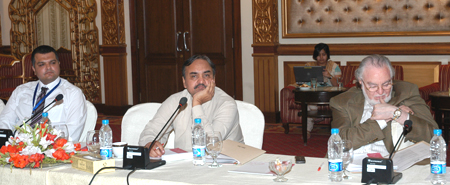
|
|
|
|
|
|
|
|
|